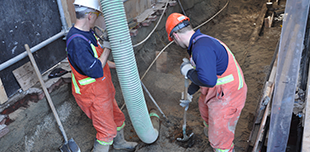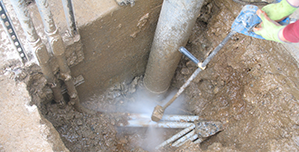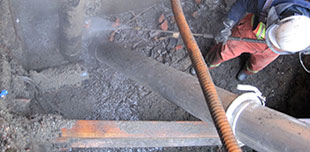Hydro-excavation Services
There are few excavation and cleaning service providers in Canada that offer Hydro-excavation and some still use outdated conventional methods that are slow, tedious and taxing. In addition to that, the country is known for its brutal winter and cold climate throughout the year. This natural factor leads to frozen soil which is extremely difficult to excavate using conventional means. The hydro-excavation method using heated water has proved to be the best solution to this problem.
About Our Hydro-excavation Services
Our Pump Truck Services offer smart hydro-excavation solutions in the Lower Mainlands of Canada. Through these modern equipment and methods, you receive quality service at an affordable price. We have fast earned a reputation in the local market as the provider of high quality excavation services. We assert our commitment to you for providing prompt service at your doorstep within the same working day.
Apart from this, here are some additional features provided:
HIGH-TECH FULLY-EQUIPPED SERVICE TRUCKS
With an entire fleet of dedicated modern trucks, you get “on the go” service wherever and whenever. Our high-tech fully-equipped service trucks can gather and store huge quantities of waste material and debris. All the trucks use a high-pressure jetting system that uses hot water to clean underground areas more comprehensively. In comparison to conventional practices, we enjoy a more impressive success rate even when it comes to cleaning underground parkades, elevator pits and narrow laneways. We also provide a cleaner and considerably cheaper option if the high costs related to repair of post-excavation damage are considered.
DEDICATED PROFESSIONALS
We have a team of certified professional servicemen at our disposal who are extensively experienced in the field of underground excavation. Our professionals ensure that the work is done with the least disturbance and confusion. Also, with the help of modern service trucks, no damage will be caused to underground equipment, cables, lines and installations.
AN EXPANDING CLIENTELE
We currently operate in the Lower Mainlands of Canada offering smart excavation solutions to an ever-growing list of satisfied customers. With a dedicated emergency response center, you can get help whenever and wherever needed. With so many success stories, we have been able to expand our area of operations and started offering smart solutions to other major towns of Canada such as Surrey, Vancouver, White Rock, Delta, and Burnaby. There is also a dedicated emergency response squad that works round the clock to provide prompt service where you want it. And we do all this while ensuring that your underground utility and pipes will take no damage in the cleaning process.
Cost-effective Comprehensive Services
Clearing underground utilities with the modern hydro-excavation method is an effective way to minimize the damages that conventional cleaning methods can cause to installations. When you compare both the methods, our service is a lot quicker, cheaper, safer and more effective in getting the work done. You are also guaranteed the least disturbance and can rest assured that the job will be done in an effective and long lasting manner.








